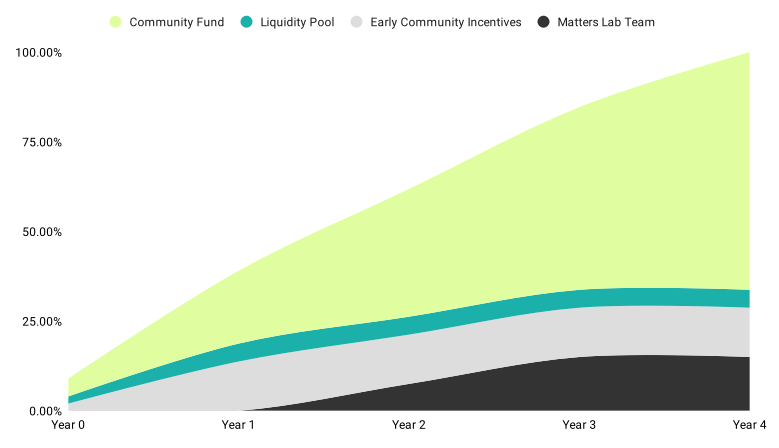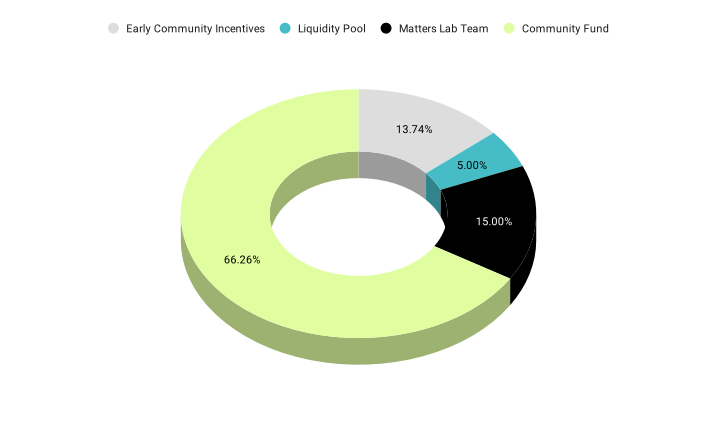
《Web3Matters 馬特週報》創辦人,軟體開發與寫作經驗超過九年。觀點文章每週更新 👉🏼 https://denkeni.substack.com
Written before The Space sets sail: Unconditional basic income and the Harberger tax
The Evolution of Regular Income
I once had a discussion with a friend about how he would like to pay his employees if he started a company. He believes that according to the results theory, high performers get high wages, and no performers get no money, making each employee like an independent partner. In my opinion, only regular fixed salaries (such as monthly salary) are paid, and the common year-end bonuses and bonuses are eliminated, so that employees can have no worries or greed for money, and focus entirely on their own interests and abilities.
Since I had a few short years, as a freelancer with unstable monthly income, I knew that it would bring personal anxiety, after all, long-term financial management is not easy. As a salaried class, I also deeply understand the monthly output value of full-time employees, how can it be the same? Therefore, giving a fixed salary every month is not to truthfully reflect work performance, but one of the most important functions is to ease the anxiety of individual economic planning.
Only now did I realize that the "basic wage" system is actually a more labor-oriented security system. Then "Universal Basic Income (UBI)" is obviously a step further, making a more important contribution to the right to life security for all people (especially workers) - everyone can receive a fixed amount of basic basic income on a regular basis without conditions. Income, then even the value and meaning of "work" will evolve with it.
Harberger Tax and The Space Insider Beta Experience
The "Harberger tax", which has become popular again due to the book "Radical Markets", can be briefly summarized in two explanations:
- Once you own an asset, you must set a price for it, and someone else can pay that price to buy it at any time (so the price ultimately reflects its value).
- Asset holders must pay taxes on time as a percentage of the list price (so they can't set an exorbitant price).
We can imagine that this concept should be very suitable for managing public property rights, and also very suitable for actual execution with smart contracts in the blockchain. The Space is based on such a "radical market" tax system, a pixel canvas game developed with Reddit Place as the prototype.
On The Space, every pixel that needs to be purchased with $SPACE game tokens corresponds to an ERC-721 Token (NFT) named Planck (PLK), and each action requires an additional $MATIC fee (i.e. the gas fee on the Polygon blockchain).
Therefore, I suggest that players who want to participate can open another account or wallet address to play, because there will be a large number of game action transaction records.
Taishiguan said: Since it is a "game", I never read the operating instructions (nor did it at the time), and went directly to the field to experience it.
In the first internal test, I only used the mobile phone to operate, and I felt that it was difficult to do. I reported the function suggestion, and finally made the side status bar foldable, at least usable. I tried to buy a few pixels and put them around, but the next day I found that there was no movement in either the pixels or the wallet balance. I thought maybe the Harberger tax system was not online yet, so I pressed it first.
For the second internal test, I changed a wallet address and switched to a traditional computer browser for a complete experience. I tried to buy a pixel again, and I woke up the next day and still no tax was deducted. I felt strange. I asked the game administrator how to trigger the tax collection mechanism. Only then did I understand the original internal test of the game. There is still no automatic tax collection mechanism, but manual Call the settleTax function in the smart contract; on the other hand, I am discussing with a group of players how to clean up the person who drew the "yellow dirty pixel". Since the game interface only reveals the number of yards before and after the wallet address of the pixel holder, I searched Records on the blockchain, find out the full wallet address of the person, take the tokenId_ parameter in the most recent pixel purchase transaction, send out the first tax levy in the internal test that I know, and put the person’s wallet balance in one go Empty! And it turned out to be one of the players we discussed together just now! (For wonderful pictures and texts, please contact another article " The SPACE (II) Apocalypse! Experience Life in Dot Pixels "). Later, he inspired this person to change his ways, write a third-party smart contract, and jointly execute the game pixel tax clearance with another player, which is called "tax clearer" in history.
In the third internal test, I watched other people's discussions on The Space Discord, and then I noticed that each pixel still has "income" to collect. This is not the "toll collection" in the traditional Monopoly game. The name on the blockchain is exactly "Withdraw Ubi" (Get Unconditional Basic Income)! But I have to manually click on individual pixels and pay the handling fee to collect the "unconditional basic income", which I don't think is good.
Taxation and Basic Income at The Space
In my opinion, The Space's real highlights are the "Harberger Tax" and "Unconditional Basic Income." If these two core mechanics don't work well enough, the game's highlights are completely lost. However, the mechanics implemented on The Space have limitations that deviate from the original design benefits. This article will not go into details, but will briefly discuss its causes and effects.
From an engineering point of view, I deduce that it is limited by The Space project team's decision to use only smart contracts on the blockchain to develop the core mechanism (on-chain), and use individual pixels as operating units to make each "action" All must be a transaction, and a handling fee needs to be paid, including the purchase of pixels, tax collection, and basic income acquisition, all of which require additional execution cost handling fees.
Therefore, the current Harberger tax that needs to be paid in The Space cannot be accurately predicted when it will be levied. Pixel holders can only estimate and calculate whether the $SPACE in the wallet is enough to pay the total tax.
"Unconditional Basic Income" actually becomes "Pixel Basic Income" (meaning that holding pixel NFTs not only requires paying taxes, but also earning basic income), because The Space mechanism uses a portion of Harberger's tax as a source of basic income , but not evenly distributed by wallet (after all, in the Web3 world where the real-name system is not implemented, anyone can create an infinite number of wallets), but evenly distributed according to "pixels". The project team pointed out in the " Introduction to The Space " document that through the basic income mechanism, the liquidity of the pixel trading market can be stimulated, but it loses the characteristics of "unconditional" basic income - because players must hold pixels, basic gross income The basic income that is proportional to the number of pixels held and must be manually collected for individual pixels is far from the original concept of "everyone can receive a fixed basic income regularly and unconditionally".
Before the $Space White Paper and SpaceDAO set sail

From " Introducing $SPACE " (i.e. the $SPACE white paper), it can be seen that $SPACE game tokens will be issued in a 4-year period.
The founding team of the Matters Lab Team project accounts for 15%, and will be locked for 1 year before being unlocked linearly in a 2-year period. This shows that the project team has the motivation to operate the game well for at least 1-3 years.

Interestingly, the default Liquidity Pool in circulation is only 5%, while up to 66.26% will be distributed to the Community Fund year by year, which is managed by SpaceDAO. That is, during the first year of inflation, the value of $SPACE may change with the entry of external funds and early contributors (Early Community Incentives), and economic incentives may be the main game factor; but as SpaceDAO funds account for The ratio will gradually increase, and the actual ownership will be the members of SpaceDAO. Based on the support of canvas creation or other proposal ideas, it will eventually become the main factor for the long-term operation of The Space.
If the second law of thermodynamics is used to analyze: in a closed system, entropy (chaos) will only increase naturally; on the contrary, if you want to reduce entropy and create works with meaningful rules on canvas, you must introduce external energy. so that the system is no longer closed. And these man-made intentions are an endless stream of external energy.
The question is, in addition to spending money to paint and paint on pixels, creators may lose pixels at any time due to Harberger tax treatment, which is not conducive to the long-term preservation of works and the creator's willingness to continue painting?
More than a game: Digital Lennon Wall
On the limitless Internet, anyone can share information, but most likely will not be seen at all. On the canvas of The Space with limited boundaries, each pixel has actually become a valuable public resource. The project team also calls it a "digital Lennon Wall". Anyone can post information on it and smear away the legacy left by the predecessors. The relics of —— Strictly speaking, it cannot be erased, because all transaction information is on the blockchain, which means that anyone can replay this "Digital Lennon Wall" that has appeared in the past based on these transaction information at any time. All image information; in other words, The Space uses Harberger tax governance, trading time scales for more canvas space, and none of the paintings that ever existed really disappeared.
The history of people's creation on The Space is all on the blockchain, which truly embodies the true meaning of "an instant is eternity".
People often say "one day in the currency circle, one year in the world", then it is expected that the currency circle where the $SPACE game token is issued in 4 years will be 1,461 years later (!) in the world. Will the Polygon blockchain nodes still be there? Woolen cloth? Or will we be left intact, what about the creative history of The Space over the past 14 centuries?
Extended References
- The Basic Income Reader for Everyone, published by Facebook.
- Radical Markets, Eight Flags Culture.
- Vitalik Buterin, On Radical Markets .
- @Unidentified Flying Rabbit, real private ownership! Deep dive into the Harberger tax .
- @蠓子Durian, use the economic model of the Space game to analyze the unsolved problems of the Hubberg tax and UBI .
Like my work?
Don't forget to support or like, so I know you are with me..
Comment…